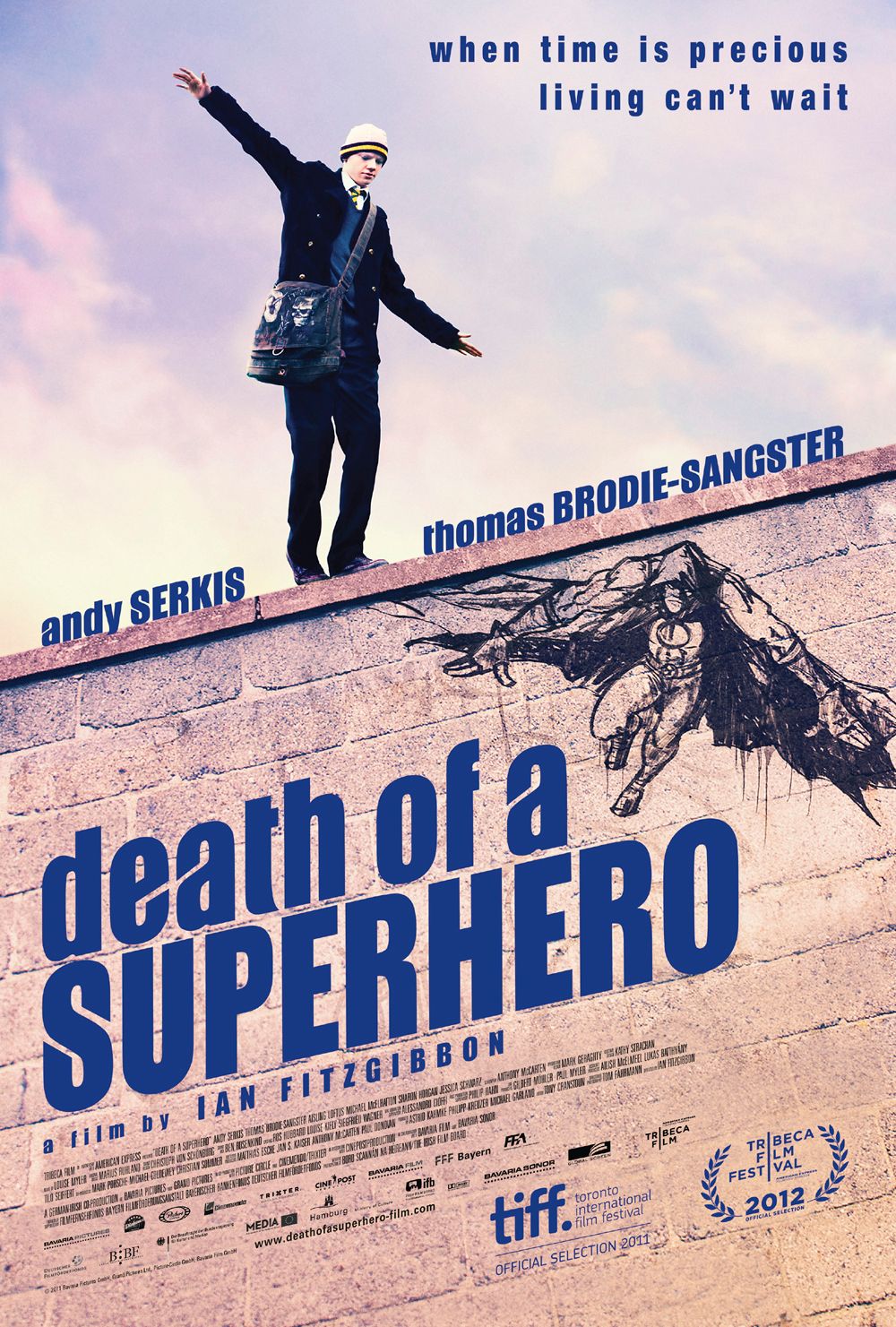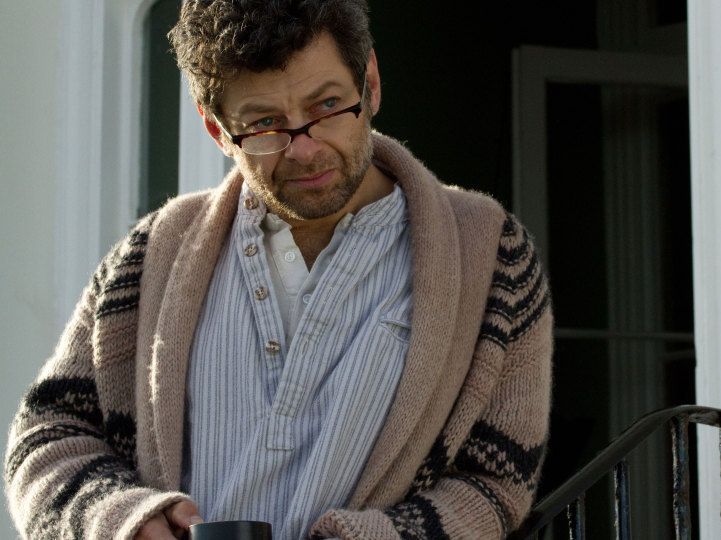Director Ian Fitzgibbon’s Death of a Superhero made a splash last year during its world premiere at the Toronto International Film Festival, and its easy to see why: The coming-of-death story intertwines imaginative 2D cel animation with a touching narrative. Add in that it stars Andy Serkis and Thomas Brodie-Sangster in top form, and you begin to understand why the film resonates.
Based on Anthony McCarten’s novel of the same name, the film follows Donald (played by Brodie-Sangster), a troubled 15-year-old with terminal leukemia who faces the prospect of dying at a young age while simultaneously attempting to navigate adolescence. Donald escapes into the violent, visceral world of his drawings, but his reality – school, overbearing parents and romantic relationships – looms. When he’s introduced to psychologist Dr. Adrian King (Serkis), he begins to reconcile the two, with visually and emotionally intense results.
Serkis and Brodie-Sangster turn in phenomenal performances. It’s hard to envision Brodie-Sangster as anyone but Liam Neeson’s adorable, love-struck son in Love, Actually, but he proves himself an accomplished young adult. And Serkis, who we’re more accustomed to seeing in motion-capture form in The Lord of the Rings and Rise of the Planet of the Apes, lends an understated passion to the role.
Spinoff Online spoke with Fitzgibbon while he was in New York City for Death of a Superhero’s U.S. premiere at the 2012 Tribeca Film Festival. He discussed his favorite graphic novels, working with real-life nurses for cancer research, the genesis of the film’s graphics, the influences he took from his teenage children, and the Tintin connection between his two lead actors.
SPINOFF ONLINE: I noticed a Theo and Eliza Fitzgibbon in the credits, under "teenage crowd."
Ian Fitzgibbon: God, you are sharp!
Are those your relatives?
They're my kids.
Ah, so your kids are teenagers!
Yeah, 19 and 17.
So did they advise you in crafting Donald's personal and public personas in the film -- his private life, his school situation, etc?
Yeah, completely. I was writing scenes and I'd come home and talk to my daughter Liza and I'd say, "Oh, well we wrote the scene where he goes on a date with the girl." And she said, "What?" And I said, "Yeah, he goes on a date with the girl." And she said, "No. Nobody says 'date.'" And I said, "Well, what do they say, then?" She said, "I dunno, but they don't say 'date!' That's really old-fogey talk!"
It's not surprising, because Donald's relationships with classmates, friends and his parents come across as really organic.
Yeah, I drew on my experience as a parent, there -- for sure. [laughs]
The graphics in this film are really cool. What are the origins of their look?
What I imagined is this 15-year-old kid in the back of the classroom, bald, no eyebrows, probably with a massive erection with some gorgeous girl at the front of the class, and doodling away -- all that energy going into this thing, and on top of that he knows he's going to fucking die! So how's that going to be? How are those drawings going to turn out?
Who did you work with to develop the drawings?
The guy I ended up with [Lukas Frese] -- he had a satchel … and I looked at his satchel and I looked at his sneakers and I thought, "God, he almost looks like the kid in the movie!" I thought that was really interesting. And then I had a chat with him and I said, "How did you start drawing?" And he said he used to get in trouble at school and he was always sitting at the back because they thought he was really dumb, and he used to draw all these drawings. And I said, "Well what kind of stuff did you draw?" And he showed me stuff, and one of them was somebody being hung, giving the finger.
I love that one. I'm glad that made it into the movie!
Yeah! And I thought, "OK, he's my man." He's brilliant.
Are you a fan of graphic novels? Is that part of what endeared you to the material?
I love Tintin -- I grew up with that. And I love Sin City. And I love the gothic version of Batman -- those comics that kind of got glossier and a bit more dangerous and more sexual, that stuff I really love. But I was a total virgin to all this stuff. I had no idea. All I said was, "I don't want the film to stop for animation. It has to be inseparable."
What about the other part of it, the portion dealing with Donald's terminal cancer. Did you do a lot of research, interview patients, visit cancer wards?
It's weird because even now I find it really hard to talk about. Yeah, I did. I spoke to nurses, but they tell you … [looks out window, pauses, tears up] Sorry.
It's OK. I dealt with hospice nurses when my dad had terminal cancer. They're amazing people. true heroes. But I know all too well that it's a traumatizing experience.
And also, they have to deal with kids who sometimes aren't being looked after because their parents can't handle it. So that's tough.
So you worked with Andy Serkis the same year that he worked on Tintin and Rise of the Planet of the Apes.
Yeah, he was just coming off Planet of the Apes, because I remember thinking, when I saw his energy, I was like, "Woah!"
This is such a different role than audiences are used to seeing him in, primarily because audiences aren't used to seeing him at all. How did you both reconcile that, especially coming off all the intensity of Apes?
He has a huge engine. He's a very passionate, committed actor. So what I was encouraging him to do was to think about stillness. You know, to just listen. You don't have to be friendly, you don't have to reach out. Just be present. And I spoke to psychologists who deal with teenagers, and … I said, "What's it like -- fundamentally, what's your job?" And she said, "My job is to stand alongside. That's all I have to do." It's patronizing to say, "I'm here for you," because they're not the one dying. And I think that was something that really struck me, and I just love the idea that Andy's character doesn't patronize Donald.
Thomas and Andy have great chemistry in the film. Did you encourage them to hang out before or during filming?
I didn't actually have to, because Thomas was the original Tintin. Thomas did five weeks of shooting on Tintin.
That's right! So you lucked out, because they had that initial rapport!
Yeah! And also, I could sense Andy kind of going, "This kid is good."
You work really well with children in this movie. Were any of the kids in the hospital alongside Donald sick in real life, or were they also hired actors?
No, they were actors. Although the little girl, we shaved that much [mimics a strip along the side of his head] of her hair.
Did you work with Anthony McCarten at all? Because I know he originally wanted to direct it.
That's true! No, I made a very clear rule: There's only one director, and I have to re-write it. Because I couldn't do that -- to him or to me. I had to make it my own.
Death of a Superhero is available on VOD.



